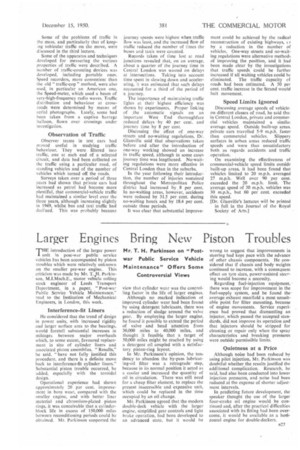Larger Engines Bring New Piston Troubles
Page 61

If you've noticed an error in this article please click here to report it so we can fix it.
Mr, T. H. Parkinson on "Post. war Public Service Vehicle Maintenance" Offers Some Controversial Views
THE introduction of the larger power unit in post-war public service vehicles has been accompanied by piston troubles which were relatively unknown on the smaller pre-war engine. This criticism was made by Mr. T.,1-1. Parkinson, M.I.Mech.E., motor vehicle rolling stock engineer of Leeds Transport Department, in a paper, "Post-war Public Service Vehicle Maintenance." read to the Institution of Mechanical Engineers, in London, this week.
Interference-fit Liners
He considered that the trend of design in power units, with increased rigidity and larger surface area to the bearings. would foretell substantial increases in mileages between major overhauls which, to scene extent, favoured replacement in situ of cylinder liners and associated piston assemblies. " Results," he said, "have not fully justified this procedure, and there is a definite move back to interference-fit cylinder liners." Substantial piston trouble occurred, he added, especially with the toroidal design.
Operational experience had shown approximately 20 per cent, improvement in bore wear, compared with the smaller engine, and with better liner material and chromium-plated piston rings, it was conceivable that a cylinderblock life in excess of 150,000 miles between reconditioning periods could be obtained. Mr. Parkinson supported the view that cylinder wear was the controlling factor in the life of larger engines.
Although no marked indication ot improved cylinder wear had been found by using detergent lubricants, there was a reduction of sludge around the valve gear. By employing the larger engine, he found it possible to extend the period of valve and head attention from 30,000 miles to 40,000 miles, and thought it feasible that a target of 50,000 miles might be reached by using a detergent oil coupled with a satisfactory piston-ring layout.
In Mr. Parkinson's opinion, the ten. dency to abandon the by-pass lubricating-oil filter was a retrograde step, because in its normal position it acted as a cooler and increased the quantity of oil in circulation. There was stilt need for a cheap filter element, to replace the present inaccessible and expensive unit, which could he replaced in the time occupied by an oil change.
Mr. Parkinson agreed that the modern double-deck vehicle with the larger engine, simplified gear controls and light brake operation, had been developed to an advanced state, but it would be wrong to suggest that improvements in steering had kept pace with the advance of other chassis components. He considered that if chassis and body weights continued to increase, with a consequent effect on tyre sizes, power-assisted steering would become a necessity.
Regarding fuel-injection equipment,. there was scope for improvement in the fuel-supply system, and he found the average exhaust manifold a most unsuitable point for filter mounting, because of engine movements. Service experience had proved that dismantling an injector, which passed the accepted standards, did not improve its operation and that injectors should be stripped for cleaning or repair only when the spray characteristics and breaking pressures were outside permissible limits.
Quietness at a Price
Although noise had been reduced by using pilot injection, Mr. Parkinson was doubtful whether the results justified the additional complication. Research, he said, had also been conducted into lower injection pressures, and noise had been reduced at the expense of shorter adjustment intervals.
In predicting future development, the speaker thought the use of the larger four-stroke oil engine would be continued and, after the practical difficulties associated with its fitting had been overcome, it would be available as a horizontal engine for double-deckers.




































































































